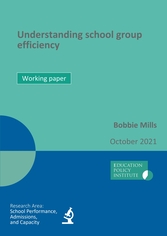- How should “efficiency” in school groups be measured?
- Which school groups in England are the most efficient?
- Why are some school groups more efficient than others?
The Education Policy Institute (EPI) has launched a major research project to understand how to improve efficiency in England’s school system.
The EPI School Groups Efficiency Project aims to develop the most robust measure of efficiency among school groups to date. Developed in collaboration with the sector, the research aims to become an essential resource that can be used to inform key decisions of both school leaders and policymakers.
The new project includes a working paper published today [Thursday 7 October], with preliminary findings on efficiency among school groups in England – those identified by researchers as achieving high outcomes with a lower level of resources.
The research considers school efficiency in academy trusts, local authorities, and other school groups.
Alongside these findings, EPI has set up a national consultation seeking feedback from education leaders and sector experts. You can respond to this below.
.
Why we have launched a project on school efficiency, and why you should contribute
Every year, the UK Government spends around £45 billion on schools in England. School leaders and other education authorities are responsible for deploying this resource efficiently and sustainably.
One of the greatest challenges is to establish whether schools and trusts are run efficiently, and which of them have the most efficient operating models, so that best practice can be shared among individual schools and wider school groups.
Understanding school efficiency is increasingly important in the context of real-terms cuts to pupil funding over the last decade. In recent years, teachers and school leaders have been under pressure to make increasing savings, whilst also delivering greater levels of support to pupils as wider children’s services have been reduced. The pandemic has also brought further pressures to school finances.
In this context, we want to understand how existing resources might be best used in the school system, in order to identify practices that bring genuine efficiencies – without compromising the school workforce or the quality of pupils’ education.
Understanding efficiency is also important following significant changes to the school system over the last decade, including the arrival and growth of multi-academy trusts (MATs).
EPI’s research aims to develop the most advanced and comprehensive measure of school group efficiency to date – going beyond those used previously, such as those currently employed by the Department for Education.
We want to hear from leaders and experts representing a diverse range of schools and school groups on our efficiency findings and our methods used.
.
Read the report’s findings on efficient schools and trusts
The full EPI working paper on school efficiency, released today, can be read here.
This paper is a first step in developing new measures of efficiency among schools and school groups. It outlines different methods for estimating efficiency and presents results for feedback and improvement.
We greatly value feedback from education leaders and sector experts. EPI will use your views to feed into a final report on school efficiency which, when completed, will be an authoritative resource for informing the decisions of leaders and policymakers.
Our research recognises that the work of schools cannot simply be reduced to a series of “inputs” and “outputs”, as described in the report. Our school efficiency research does not aim to capture everything that makes a school effective – but it does attempt to cover many of the key decisions that school leaders can make about how to deploy their resources.
How to give feedback
Anyone can give feedback on our findings and methodology on school efficiency.
To do this, please send your responses in a written email or document to feedback@epi.org.uk
When you contact us, please provide details of the organisation that you are representing – for example, a school, academy trust or university faculty.
[UPDATE] We held a consultation which closed on the 16th November, but we still encourage you to share your views with us.
.
Consultation questions
Below are some of the consultation questions that we are seeking feedback on. You can find these in full on p.42 of the report.
- Our working paper on efficiency aims to identify school groups that use lower levels of resources (described in our research as the efficiency “input”) whilst achieving high outcomes for pupils (known as the efficiency “output”). The “inputs” that we use are (1) teacher experience, (2) the level of leadership, (3) expenditure on education support staff and (4) expenditure on ‘back office’ functions. Do these four efficiency factors adequately reflect the key decisions that school leaders make in deploying resources?
- Should we change our definitions or measures of these four factors? Should we consider any other factors when determining school resource efficiency?
- For our efficiency “output”, we use a ‘value-added’ measure of pupil outcomes, which adjusts pupil attainment for the level of challenge in the cohort. How could we improve this measure?
- Should we use Attainment 8 as our measure of attainment, given its relationship to Progress 8 and accountability, or should we opt for a broader definition of attainment?
- In our working paper, we treat multi-academy trusts (MATs) as unified entities, meaning that we consider their “inputs” and “outputs” at trust-level. For other types of school grouping (e.g. local authorities, federations, Dioceses, foundation trusts and single-academy trusts), we consider the “inputs” and “outputs” of the individual schools in each group. Does our treatment of MATs in the research adequately reflect the reality of how these groups work together? Do you have comments on our decisions for how to treat other types of school group?

